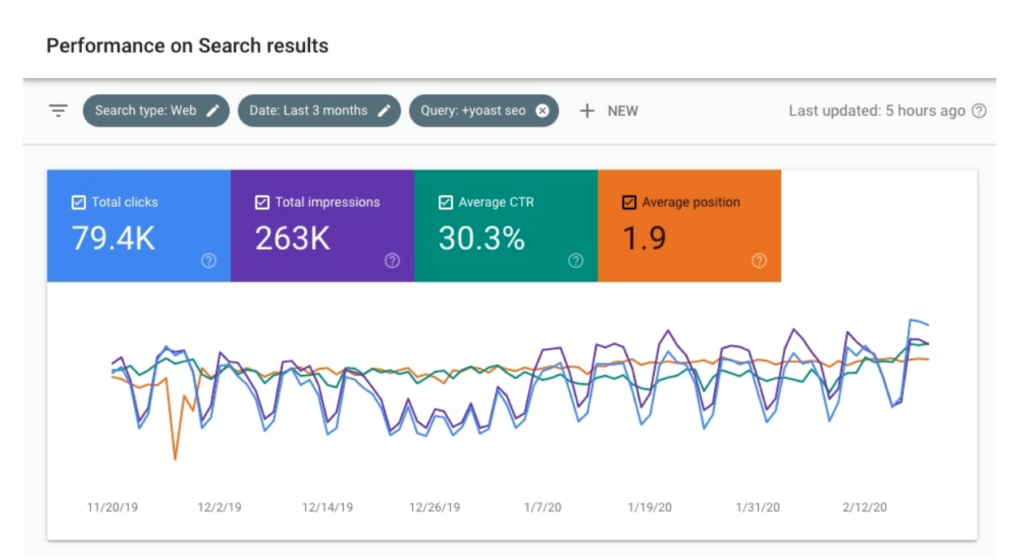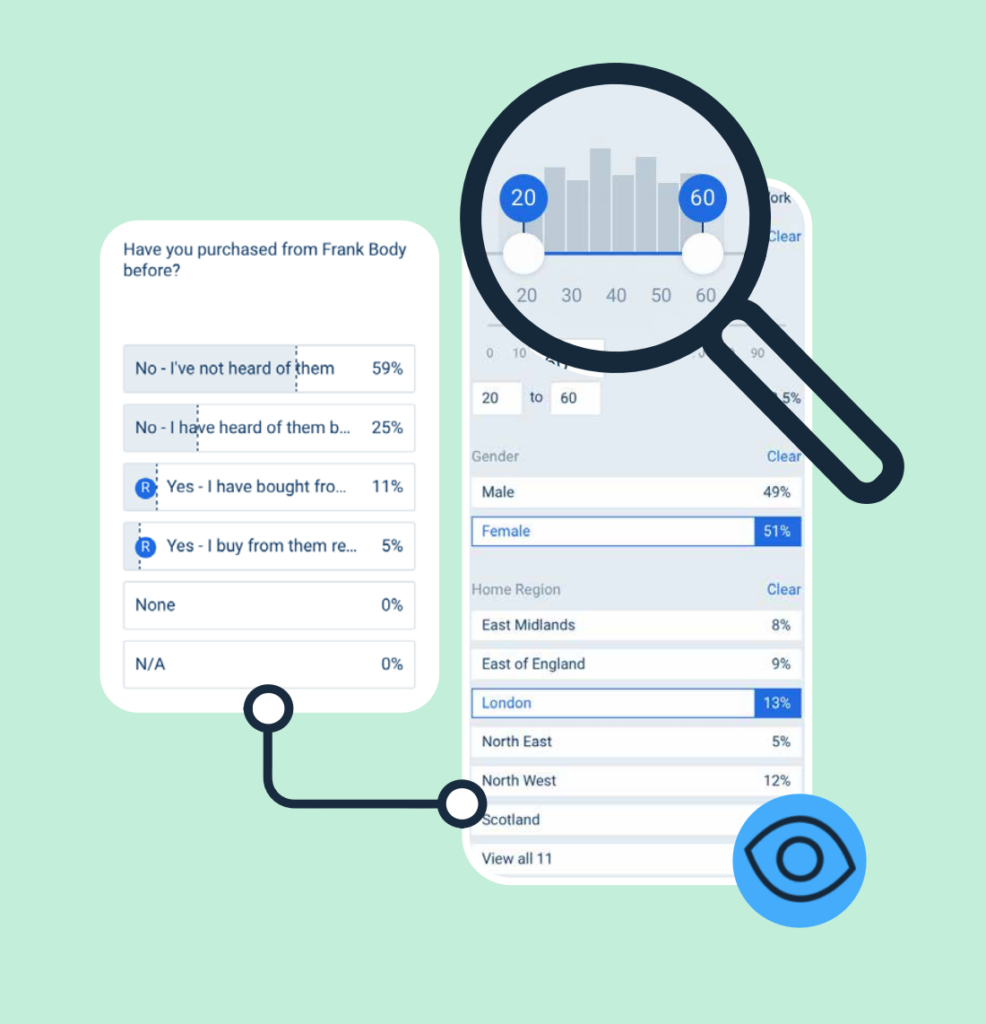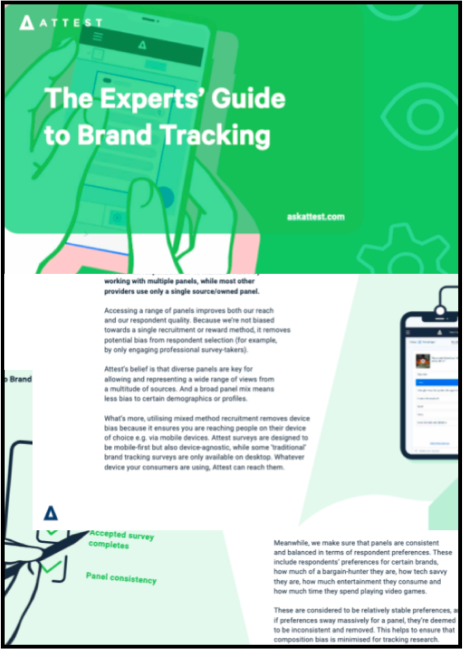75 best brand awareness survey questions to ask in 2025
Gain a better understanding of your company's brand using our brand awareness survey or build your own using our sample questions and examples.
Brand awareness isn’t just about name recognition: it’s about being remembered, trusted and chosen over your competition. And the only way to know where your brand really stands is to ask customers and target customers the right questions.
A well-designed brand awareness survey helps you measure how familiar your audience is with your brand, how they perceive it and whether you’re staying top of mind in a crowded market.
In this guide, we’ll walk through:
- what brand awareness is
- why it matters
- how to measure it
- how to craft a survey that gives you meaningful, actionable insights, with 75 questions to get you started
What is a brand awareness?
Brand awareness refers to how well people know your brand — from whether they’ve seen your logo before and can recall your name when prompted to whether they think of you before competitors
Brand awareness is also the foundation of effective marketing. If your audience doesn’t know who you are, even the best product or perfectly optimized campaign won’t bring in engagement or sales.
Customers move through different stages of awareness as they become more familiar with your brand. Let’s use Nike as an example:
1️⃣ No awareness: A consumer has never heard of Nike before. The brand doesn’t register at all.
2️⃣ Recognition: They’ve seen the swoosh or heard the name and it feels familiar, even if they’re not sure what the brand sells.
3️⃣ Recall: When asked to name sportswear brands, Nike comes to mind without any prompting.
4️⃣ Top of mind: Nike is the first brand they think of when looking for sportswear. It’s the go-to, the category default.
What is a brand awareness survey?
A brand awareness survey measures how familiar your target audience is with your brand, how well they understand your messaging and how they perceive your identity in the market. It’s a key tool to evaluate the impact of your marketing efforts and identify where your brand stands in the minds of your audience.
At its core, a brand awareness survey measures:
- Brand recognition: How easily do people recognize your brand name, logo or product visuals?
- Brand recall: Does your brand come to mind without a prompt when someone thinks about your category?
- Brand messaging: Are your core messages — like slogans, campaigns and positioning — understood the way you intended?
- Brand identity: Do people understand your mission, vision and values?
- Brand image: What emotions, ideas or associations come to mind when people think of your brand?
Why should I measure brand awareness?
When measured properly, brand awareness is far from a vanity metric. It reflects how well your audience recognizes and remembers your brand and demonstrates how effectively you stand out in your category.
The ROI of brand awareness is real., and building brand awareness has a direct impact on growth, efficiency and revenue.
When you understand your brand’s awareness levels, you can optimize your spend to build stronger customer connections and unlock growth. Here’s why measuring brand awareness is worth your time and effort.
1. It saves you money in the long run
Focusing purely on sales generates revenue in the short term, but if people buy your product without remembering your brand, you’re missing out on long-term value.
A strong brand speeds up purchase decisions and reduces reliance on paid search or display — because you’re already the first brand that pops into a potential customer’s mind when they’re looking to buy.
Case in point: Wise used brand tracking to understand the ROI of their brand-building efforts. These surveys helped link brand awareness to business growth and gave the team confidence to invest in long-term, mission-driven campaigns — including ads across the London Underground.
“Getting data points around things like brand awareness and ad recall makes it easier for us to link back to high growth in short-term sales metrics. Attest shows us what the ROI of brand work truly is.”
— Phil Dennington, Creative Lead, Wise
2. Brand wins when products blur together
In a crowded market, features and price eventually converge. At that point, people aren’t choosing a product: they’re choosing the brand they remember and trust.
Imagine shopping for a new TV. Chances are the names that come to mind aren’t based on technical specs. Rather, they’re familiar brands you’ve seen, heard of or bought from before.
Bought by Many recognized this challenge in the insurance market. Performance data could measure clicks and conversions but not how well they stood out to consumers.
Monthly brand tracking helped them close that gap and gave them the insights they needed to secure stakeholder buy-in and unlock a larger budget for long-term brand investment.
3. It makes your marketing more effective
You can’t improve what you don’t measure. A brand awareness survey helps you see which audience segments know you well and where you still have work to do.
Say your survey shows strong awareness among women, but limited recognition among men. That’s a clear opportunity to adapt your messaging or run a segmented campaign to drive new growth.That’s exactly what Pip & Nut did. They measured awareness before and after their campaigns, tracked uplift, optimized content and adjusted their target audience to help them improve their strategy and get more value out of every marketing dollar.
“We’re able to identify specific campaign moments when we can use above-the-line adverts to widen our reach. We’ve got a tracking program and partner in place that’s sustainable for the long term, and hands-on support when we need it as well.”
— Jacq Ellis-Jones, Head of Marketing, Pip & Nut
How do you measure brand awareness?
Brand awareness might seem abstract, but with the right approach, it’s not hard to measure. Ask current and potential customers targeted brand awareness questions. Then combine their responses with data from social media and search to understand how well your brand is known, remembered and trusted.
The best approach is to use a mixed approach and track both qualitative and quantitative metrics, from recall and recognition to brand sentiment and intent. This helps you build a well-rounded picture of your brand’s visibility and strength. Below we’ll touch on the main methods to use.
Get a snapshot of how target customers perceive your brand
Prove the impact of your brand building and marketing work. And stay a step ahead of your competitors to make sure you win market share.
Get started1. Unaided brand recall
Unaided recall shows whether your brand pops into customers’ minds before your competitors. Ask open-ended questions to find out which brands people without additional prompting.
ℹ️ Example: “When you think of [product category], which brands come to mind?”
2. Aided brand recall
Aided recall checks whether people recognize your brand when it’s listed alongside others. Present a short list of competitors and ask which ones they’ve heard of.
ℹ️ Example: “Which of the following brands are you familiar with?”
3. Brand recognition
Test visual or verbal awareness by showing your logo, tagline or a recent ad, then ask whether people recognize it.
ℹ️ Example:“Have you seen this logo before? If so, what brand do you think it belongs to?”
4. Brand associations
Ask open-ended or word-association questions to learn what qualities, feelings or values people connect to your brand.
ℹ️ Example: “What words or phrases come to mind when you think of [brand]?”
5. Brand perception and sentiment
Use rating-scale questions to understand how people view your brand — for example, how trustworthy or innovative it seems.
ℹ️ Example: “On a scale of 1–10, how innovative do you consider [brand]?”
6. Purchase intent and loyalty
Analyze how customers are likely to act, from whether they would buy again to if they’d recommend you to others.
ℹ️ Example: “How likely are you to recommend [brand] to a friend or colleague?”
7. Pair survey results with behavioural signals
Survey insights are more powerful when supported by data from other sources:
📊 Direct traffic shows how often people type your URL directly, which reflects recall

📊Social reach highlights how often your brand appears across key platforms
📊Search volume can reveal how many people are actively looking for your brand
8. Track results over time
Brand awareness changes. To monitor progress, run surveys regularly using tools like brand management software to help you collect data consistently and stay aligned with your goals.
70+ powerful brand awareness survey questions

Once you know what to measure, the next step is knowing what to ask. The right brand awareness survey questions help you uncover how well your audience knows your brand, how they perceive it and how loyal they really are to it.
Whether you’re looking to test campaign impact, benchmark awareness or find gaps in your audience reach, the following questions give you the insights you need to support your brand strategy with data.
We’ve grouped them by category — from awareness and perception to recall and loyalty — so you can mix, match and build a brand awareness questionnaire that fits your goals.
Brand awareness survey questions
These questions help you understand how familiar your audience is with your brand and where that awareness comes from. Use them to measure top-of-funnel visibility, identify your strongest channels and see how you stack up against competitors in your category.
| Question | Question Type |
| Which of the following brands have you heard of? | Multiple choice (multi-select) |
| When you think of [category], which brands come to mind? | Open-ended |
| Have you ever heard of [brand name]? | Yes/No |
| How familiar are you with [brand name]? | Scale |
| How often do you come across [brand name]? | Multiple choice (frequency scale) |
| What was your first impression of [brand name]? | Open-ended |
| Where did you first hear about [brand name]? | Multiple choice |
| Which brand do you think of first when you need [product/service]? | Open-ended |
| Which of the following logos do you recognize? | Image-based multiple choice (multi-select) |
| Which brands do you think are most well-known in [industry]? | Open-ended |
| Have you seen any social media posts from [brand name] recently? | Yes/No |
| Do you recall ever seeing [brand name] mentioned in the news or media? | Yes/No |
| When did you last engage with [brand name]? | Multiple choice (time-based) |
| Which products/services do you associate with [brand name]? | Open-ended |
| Can you name any brand ambassadors for [brand name]? | Open-ended |
| How well does [brand name] stand out from similar brands? | Scale |
| What do you think [brand name] is best known for? | Open-ended |
| How likely are you to remember [brand name] after this survey? | Scale |
| Which social media platforms have you seen [brand name] on? | Multiple choice (multi-select) |
| Have you seen any email newsletters or ads from [brand name] recently? | Yes/No |
| How easy is it to recognize [brand name] in a crowd of competitors? | Scale |
| Would you say [brand name] is a leader in its category? | Yes/No |
| What colours or visual elements do you associate with [brand name]? | Open-ended |
| You have problem X: what company do you turn to? | Open-ended |
💡Need inspiration? Take a look at how other brands approach brand tracking to see which questions deliver real insight. You can also explore these essential brand tracking questions to spark ideas — then mix and match to build a survey that’s tailored to your goals.
Brand perception survey questions
Once people know your brand, it’s worth asking how they feel about it. Are you seen as trustworthy, exclusive, fun or forgettable? These brand perception survey questions dig into the emotions, associations and values people connect with your brand.
| Question | Question Type |
| What three adjectives best describe [brand name]? | Open-ended |
| How would you describe our brand to a friend? | Open-ended |
| How would you rate [brand name] on innovation? | Scale |
| Do you believe [brand name] cares about its customers? | Yes/No/Not sure |
| Which personality traits do you associate with [brand name]? | Multiple choice (multi-select) |
| Would you say [brand name] is more traditional or modern? | Multiple choice |
| How would you describe the quality of [brand name]’s products? | Scale |
| Which values align with [brand name]? | Multiple choice (multi-select) |
| Compared to its competitors, is [brand name] better, worse or same? | Multiple choice |
| What kind of customer do you think [brand name] targets? | Open-ended |
| How environmentally responsible do you believe [brand name] is? | Scale |
| How would you describe [brand name]’s tone of voice? | Open-ended |
| Does [brand name] feel inclusive to you? | Yes/No/Not sure |
| If [brand name] were a person, how trustworthy would they be? | Scale |
| Is [brand name] premium or accessible? | Multiple choice |
| Does [brand name] feel authentic? | Yes/No |
| What makes [brand name] different from others? | Open-ended |
| Is [brand name] innovative or safe? | Multiple choice |
| Does [brand name] deliver on its promises? | Yes/No |
| Which of these words would you *not* use to describe [brand name]? | Multiple choice (multi-select) |
| What would you expect from a brand like [brand name]? | Open-ended |
| Would you feel proud to be associated with [brand name]? | Yes/No |
| Do you think [brand name] treats its employees well? | Yes/No/Not sure |
| Would you describe [brand name] as ethical? | Yes/No |
| How approachable does [brand name] feel? | Scale |
| What’s your gut reaction to the name “[brand name]”? | Open-ended |
Brand loyalty survey questions
Loyalty shows how strong your brand really is. Do people come back and purchase again? Recommend you to others? Stick with you even when there are cheaper or newer options out there? These questions give you insights into repeat behaviour, advocacy and the stickiness of your customer relationships.
| Question | Question Type |
| How loyal are you to [brand name]? | Scale |
| Would you choose [brand name] again in the future? | Yes/No |
| Do you consider yourself a brand advocate for [brand name]? | Yes/No |
| How likely are you to recommend [brand name]? | Net Promoter Score (NPS) |
| How many times have you purchased from [brand name]? | Multiple choice |
| Would you switch to a [brand name] competitor for a lower price? | Yes/No/Depends |
| Have you stayed loyal to [brand name] despite more affordable offers elsewhere? | Yes/No |
| What would make you stop buying from [brand name]? | Open-ended |
| Have you joined [brand name]’s loyalty programme? | Yes/No |
| Would you wait for a restock instead of switching? | Yes/No |
| Have you left reviews for [brand name]? | Yes/No |
| Would you buy from [brand name] without reading reviews? | Yes/No |
| Would you buy [brand name]’s new products because you like the brand? | Yes/No |
| Would you wear or display [brand name] merchandise? | Yes/No |
Brand Recall Survey Questions
Brand recognition is a powerful indicator of brand strength. It shows whether your brand has made enough of an impression to stick — even without prompts. These questions test how well your brand stands out from competitors and how memorable your visuals or messages are.
| Question Type | Category |
| Can you name a brand that does [product/service]? | Open-ended |
| Do you remember the slogan of [brand name]? | Yes/No/Open-ended |
| What colours do you associate with [brand name]? | Open-ended or image selection |
| What imagery comes to mind for [brand name]? | Open-ended |
| Which brand(s) do you link with [emotion/experience]? | Multiple choice (multi-select) |
| When was your last interaction with [brand name]? | Multiple choice |
| Can you recall a recent ad from [brand name]? | Yes/No |
| Do you recall any jingles or catchphrases from [brand name]? | Yes/No |
| Can you name a product or campaign from [brand name]? | Open-ended |
| What feeling do you get from [brand name]’s logo? | Open-ended |
| Can you recall a product feature from [brand name]? | Open-ended |
💡 Pro tip: Want more ideas for crafting value-packed survey questions? Check out 100 great survey questions to spark inspiration, or explore example questions from real brand tracking surveys.
Get a snapshot of how target customers perceive your brand
Prove the impact of your brand building and marketing work. And stay a step ahead of your competitors to make sure you win market share.
Get startedBrand awareness survey tips
The time has come to craft your own survey. The key is to think carefully about each question you include and how you phrase it. This will help you to avoid confusion and get the most value from your data. Here are our top tips for creating your questionnaire.
✔️Start with a brand awareness survey template
There’s no need to reinvent the wheel. A trusted template saves time and helps you include tried-and-tested question types, from aided recall to perception scales.
✔️Define your objective before writing questions
Every question should serve a purpose. Ask yourself: do you want to measure overall awareness? Compare sentiment? Spot gaps in audience reach? A clear goal keeps your survey focused and your data useful.
✔️Add demographic questions
Ask about age, gender, location, income,job role and more to help you spot trends across different groups. For example, you might find strong awareness among Gen Z but low awareness among parents. Valuable insights like these can help guide future targeting.
✔️Target the right audience
Decide whether to survey existing customers, lapsed users or people in your ideal target market. When measuring brand awareness in particular, reaching beyond your customer base is often more useful, especially if you want to grow share of voice (SOV) in a specific market or demographic
✔️Watch out for leading or biased phrasing
Avoid asking questions that assume positive awareness, like “What do you love about our brand?” Instead, stay neutral: “What comes to mind when you think of [brand]?” This helps reduce bias and gives you more honest feedback.
✔️Keep it short and focused
Respondents are more likely to finish your survey if it takes under 5 minutes, so prioritize quality over quantity. Group similar topics and limit it to 10–15 well-crafted questions that support your research goal.
✔️Test before launch
Run a quick pilot with a small group to check that questions are clear, logical and don’t produce skewed responses. A quick dry run can save you from unusable data — or worse, false confidence.
Want to know where you stand on brand awareness?
If you’re still making guesses about how aware people are of your brand, it’s time to get real insights. The right brand awareness survey gives you the data and knowledge to fuel smarter marketing, sharper messaging and more effective campaigns.
Whether you’re launching a new product, entering a new market or looking to increase SOV, Attest helps you ask the right questions and get answers you can act on. Explore our brand awareness survey template to get started, or book a demo with our team to see how our brand tracking software can help you build a brand people remember and come back to time and time again.
Make smarter brand choices based on real insights
Chart the course for your brand by understanding how target customers perceive your brand (and your competitors’)
Get startedTell us what you think of this article by leaving a comment on LinkedIn.
Or share it on:

